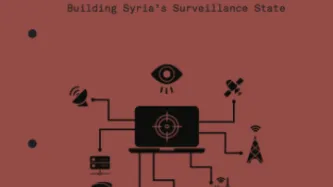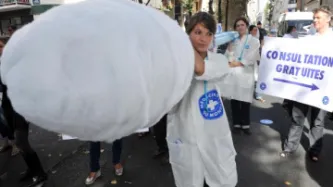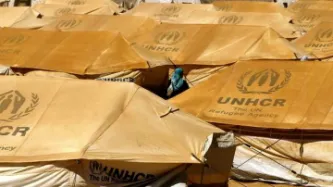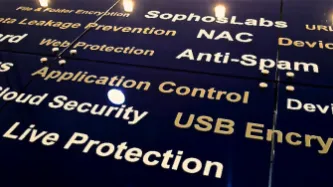Search
Content type: Examples
When the phone belonging to an American University student in Taiwan, who was subject to 14 days' quarantine after returning from Europe, ran out of battery power, in less than hour he had received phone calls from four different local administrative units, a text message notifying him he would be arrested if he had broken quarantine, and a visit from two police officers. The phone tracking system uses phone signals to triangulate locations of the more than 6,000 people subject to home…
Content type: Examples
A BBC article captures the story of a student living in Taiwan under quarantine, who reports that when his battery on his phone ran out, within an hour four different local administrative units contacted him; and a patrol was dispatched to verify his location; and a text was sent that the government had lost track of him and warned him of potential arrest for breaking quarantine.
According to the BBC report, Taiwan uses mobile signals to triangulate location of people under quarantine (…
Content type: Examples
Taiwan, linked by direct flights to Wuhan, moved to contain the virus as soon as reports of the Wuhan outbreak emerged. At the end of January, it suspended flights from China, and integrated its national health database with its immigration and customs information in order to trace potential cases. This enabled the country to send text messages to every phone on the island listing every restaurant, tourist site, and destination passengers on the Diamond Princess cruise ship visited during shore…
Content type: Examples
Taiwan's response to the coronavirus has kept the country's level of cases extremely low. Building on its experience from the 2003 SARS outbreak, the country immediately responded when the first news of the outbreak in China appeared with numerous measures that leveraged its national insurance data, immigration and customs data, real-time alerts based on travel history and symptoms, QR code scanning, and proactively sought out patients with severe respiratory symptoms who had tested negative…
Content type: Examples
In February 2019, after investigative journalists used social media posts to investigate the country's hidden role in conflicts such as those in Ukraine and Syria, Russia began moving to ban its soldiers from posting any information that would expose their whereabouts or their role in the military. The ban would include photographs, video, geolocation data, and other information, and prohibit soldiers from sharing information about other soldiers and their relatives.
https://www.reuters.com/…
Content type: Report
Privacy International’s investigation contains evidence of the Syrian government’s ambitious plans and projects to monitor the national communications infrastructure, the technical details of which are revealed for the first time. Hundreds of original documents also highlight surveillance trade in this region leading up to and during the Arab Spring, which involved companies from around the world.
Content type: Press release
Privacy International has today published an investigation, which sheds light on the shady deals that built Syria’s surveillance state and the role Western companies have played in its construction. The investigation also shows how Western surveillance companies seek to exploit loopholes to do business with repressive states.
Key points:
Technical specifications acquired by Privacy International reveal the Syrian government’s ambitious mass surveillance projects, including a nationwide…
Content type: News & Analysis
3 June 2014
The following article written by Carly Nyst, Privacy International's Legal Director, originially appeared on the Future Tense blog on Slate:
The news that the CIA is no longer using vaccination programs as a front for spying operations may come as a relief to many humanitarian workers. Yet their fears should not be completely assuaged, because the CIA’s activities—which undoubtedly threatened the safety of humanitarian workers and those they seek to help—pale in…
Content type: News & Analysis
Humanitarian agencies are collecting personal information for Syrians caught in the crossfire of a drawn-out and bloody civil war. Indeed, refugees fleeing persecution and conflict, need to access services and protection offered by the world’s humanitarian community. But in the rush to provide necessary aid to those afflicted by the crisis in Syria, humanitarian organisations are overlooking a human right that also needs protecting: the right to privacy.
Humanitarian and aid agencies are…
Content type: News & Analysis
When a product line becomes engulfed in controversy, the PR team's first move is to distance the corporation from the damage. The surveillance market is not immune to this approach, so when companies products are found to be in use by repressive regimes, the decision many boards make is simply to sell off that technology. This increasingly repetitive narrative is failing to solve any of the problems inherent with the sale of surveillance technology and in fact, is creating more.
The …
Content type: News & Analysis
After a successful investigation by the US government into the illegal reselling of over a million dollars worth of surveillance equipment to the Syrian regime, Dubai distribution company Computerlinks FZCO has agreed to pay the maximum civil penalty of $2.8 million.
Computerlinks, in three separate transactions between October 2010 and May 2011, sold $1.4 million worth of devices developed by California-based Blue Coat to the state-run Syrian Telecommunications Establishment, which…




